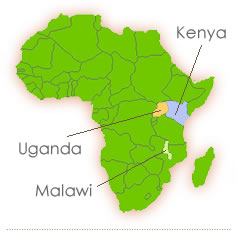 | | History of FurahaTrading Company |  |  |  |
FAST FACTS: TEA FROM AFRICA
It might surprise you to learn that 25% of the world's tea is produced in Africa.
The three main types of tea are green, black and oolong. All three are made from the same plant species; it is during processing that each kind becomes unique to its specific calling. Black teas undergo several hours of fermentation during preparation; oolong teas receive less fermentation; and green teas are not fermented at all.
Tea has been a trade item for at least three thousand years. It was first cultivated and brewed in China. Presently, some of the best varieties come from Kenya. The best teas, with very few exceptions, are produced in warm, mountainous regions. Tea from each region has its own unique characteristics.
The farmers we trade with grow their teas in the Kericho region, considered by many to be the tea capitol of Africa. Because of its robust flavour, Kenyan tea is world-renowned and well worth its steeper prices in aahhhhhh-someness!
The Many Benefits of Our Tea:
- No additives, preservatives or artificial coloring
- Cholesterol free (when enjoyed without milk, cream or other additions)
- Natural source of fluoride (helps prevent tooth decay and increases bone density)
- Natural, safe and pure -- fat-, calorie- and sodium-free
- Contains vitamin E, reducing the risk of a variety of chronic illnesses
- Contains vitamin C, stress-reducer and infection fighter
- Contains chemicals which help fight against the growth of tumors and fight viral diseases
- May help prevent dementia, Alzheimer's and Parkinson's Disease and improve ability to focus (Toronto, Canada Sept 18, 2007 findings)
- Black tea from Kenya has won international acclaim in the taste and aroma category. Most of Kenya's teas are blended with other teas to produce the most popular varieties found in stores and specialty shops today. But Kenyan tea, in its purest form, is also gaining in popularity in many markets around the world.
- Green, white and orthodox teas from Kenya also have gained an international following and reputation in health-conscious circles. Green tea is processed without fermentation to fully preserve its healthful qualities, while white tea is made from tea buds.
- Kenya teas are world-renowned for their brightness, attractive color, brisk flavor, and for the unique textures of the leaves. They are winning international acclaim for consistently high quality and captivating aromas.
- Kenya is a major black tea producer. Most Kenya black tea is CTC grade and is used in many of the most-famous blends.
Furaha Trading Company packs a variety of flavoured, herbal and green teas for North American markets.
Fast Facts: Coffee from Kenya and Uganda
In Kenya, we purchase only top-quality coffee from distributors who uniquely use the ripe red berries coming from the original coffee varieties of SL. 28, French mission, SL. 34, K7 and Blue Mountain - varieties introduced into Kenya early in the 20th Century. With the benefit of good volcanic soil and sunshine, they maintain fuller, redder and heavier quality than in any other place. Our supplier uses only holistic production methods because they - and we - take our customers' concern for a healthy community and environment seriously. Kenya coffees are enjoyed for their surprising citrus flavor and are among the finest coffees available.
Uganda coffees are renowned for their delightful citrus flavor and are one of the finest coffees on the market. Similar to Kenya coffees, Uganda's coffees are bold and powerful, with a hint of spice, but with slightly less body. Most Uganda coffee is Robusta, but another variety -- Arabica coffee -- is most similar to Kenyan coffees. Coffee from Mt. Elgon's western slopes, known as Bugishu Arabicas, are considered the finest coffees produced in Uganda. More than five million Ugandans make their living growing, harvesting and exporting coffee, and fully one-third of the country's coffee exports come from Mt Elgon's western slopes.
Furaha Trading Company has a fully integrated tea and coffee plant in Mombasa, Kenya.
Fast Facts:Macadamia
It takes at least seven years for a macadamia tree to produce its first harvest. The nuts are then hand-picked and carefully roasted to bring out their fabulous flavour.
All of our macadamia nuts come from Malawi. Quality control at our processing plant is intense and ever-present.
And because we care about the environment, we make sure that nothing is wasted: macadamia nut husks are recycled and returned to the fields (to ensure a seasonal harvest) and macadamia nut shells provide power, to reduce the taking of native trees.
Furaha Trading Company has an on-site processing plant for macadamia nuts in Blantyre, Malawi.
|
|
| 
| FurahaTC ships quality tea, coffee and macadamia nuts from the following countries:
|
 |